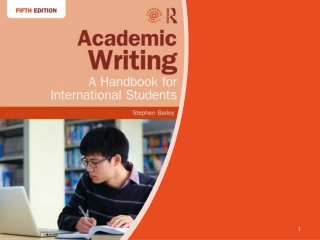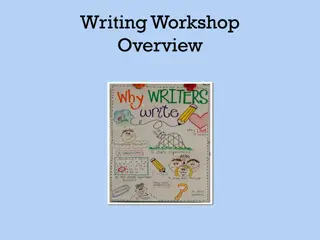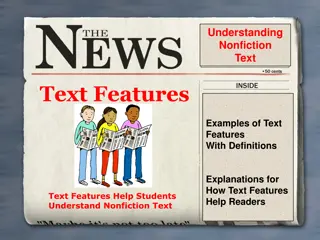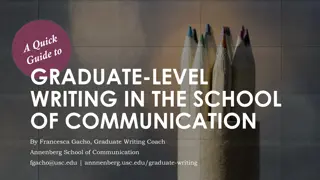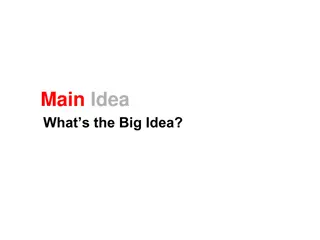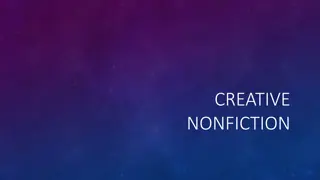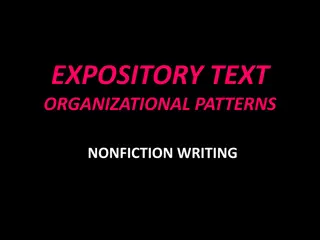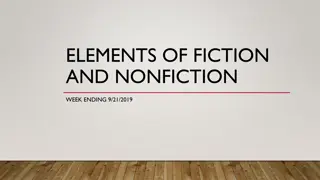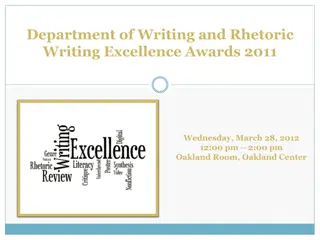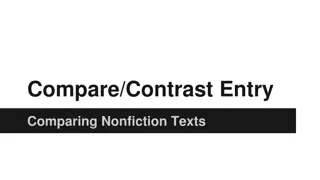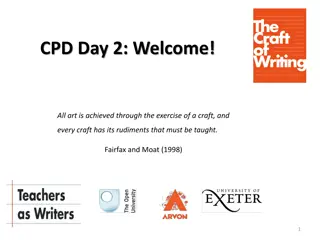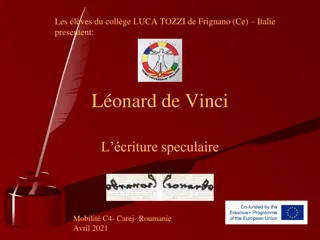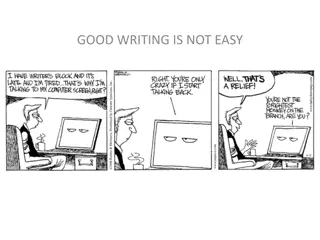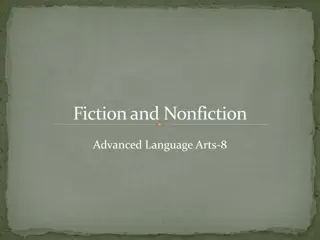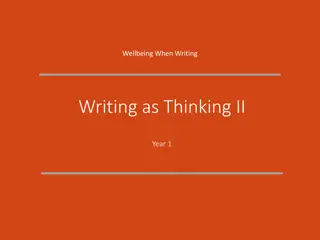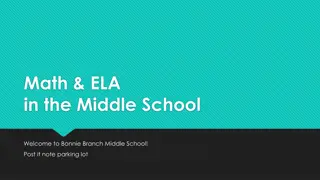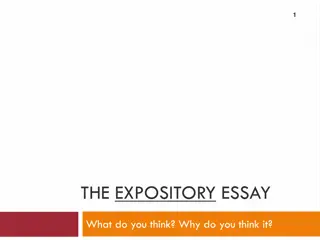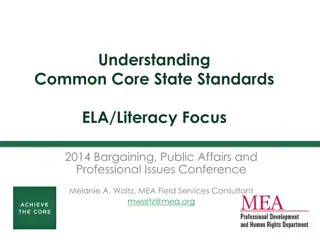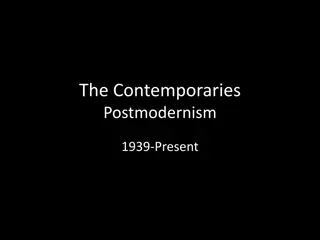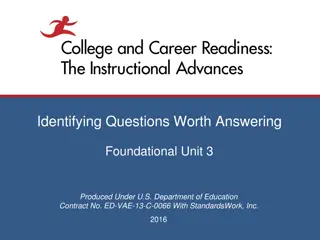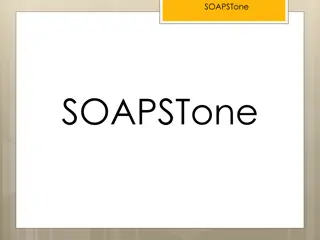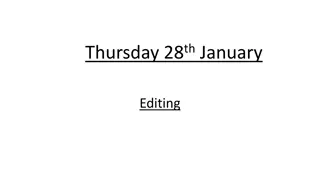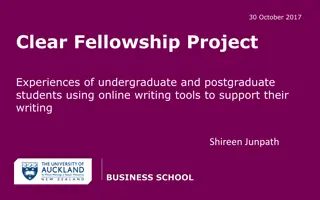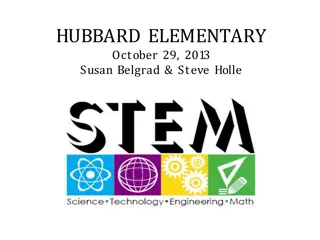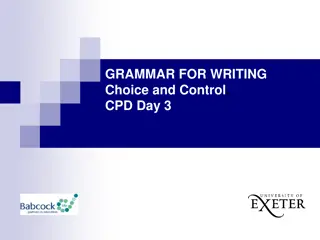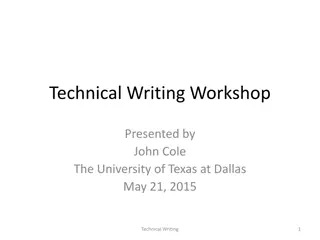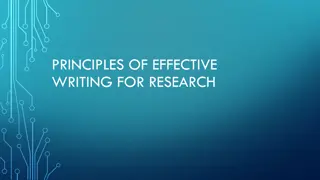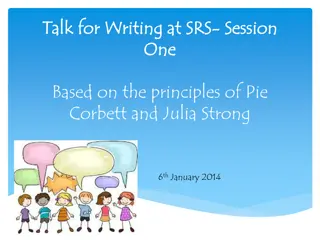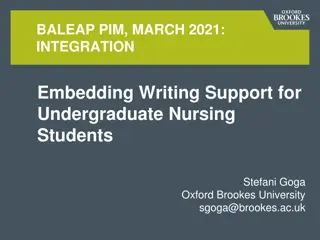Understanding the Academic Writing Process
Explore the stages involved in academic writing, from analyzing the title to proofreading the final draft. Learn about the basics of writing, types of academic writing, common reasons for writing, and text components like paragraphs and citations.
1 views • 42 slides
Exploring Citizen Journalism and Non-Fiction Writing
Explore the world of citizen journalism and non-fiction writing, learning about text types, adapting writing to conventions, considering audience, purpose, and tone. Discover the significance and usefulness of non-fiction writing, and delve into creating various text types. Uncover the role of citiz
1 views • 11 slides
Comprehensive Overview of English Writing Course
This comprehensive English writing course, led by lecturer Muhammad Muslim Nasution, covers various aspects such as grammar, vocabulary, writing styles, and assessments. Students are required to actively participate, submit assignments, attend classes regularly, and produce writing projects. The cou
2 views • 8 slides
Comprehensive Guide to Writing Workshop Essentials
Explore the fundamental elements of a successful writing workshop, including connecting Common Core standards with writing practices, emphasizing the writing process over the final product, establishing a conducive room environment, and providing essential materials for effective writing sessions.
1 views • 18 slides
Understanding Text Features in Nonfiction Texts
Text features are essential components of nonfiction texts that authors use to enhance reader comprehension. They include elements such as tables of contents, indexes, glossaries, and titles, each serving a unique purpose in aiding readers to navigate and understand the content. By utilizing these t
1 views • 15 slides
Mastering Academic Writing: Strategies for Success
Academic writing is a formal style of writing with specific characteristics such as accuracy, brevity, and clarity. Understanding academic style is crucial for success in your course as it reflects your engagement with the content. Successful academic writers read, learn new vocabulary, and have a s
0 views • 23 slides
Challenges and Perspectives in Academic Writing for English Learners: Insights from Yemeni Students and Educators
Exploring the challenges and experiences of MA English students in academic writing, the narrative reveals issues faced by learners in Yemen such as outdated curricula, lack of teaching aids, and struggles with writing skills. Insights from a teacher highlight improvements in syllabi yet continued c
0 views • 14 slides
Academic Writing Essentials: Background, Types, and Formats
Explore the essential aspects of academic writing in this comprehensive guide. Learn about the purpose of academic writing, common types such as projects and essays, and the formats for short and long writing tasks. Discover the features of academic writing like accuracy, objectivity, and formal sty
6 views • 46 slides
Understanding Graduate-Level Writing in Academic Communication
Explore the nuances of academic writing at the graduate level in the School of Communication with Francesca Gacho, a Graduate Writing Coach. Learn about the features, characteristics, and strategies necessary for various genres of writing in this context. Discover the expectations and conventions of
2 views • 30 slides
Understanding the Main Idea in Nonfiction Texts
In nonfiction writing, the main idea or central idea is crucial. It represents the most important points that tie all information together within a paragraph. Sometimes, the main idea is stated explicitly, while other times it is implied. Good readers identify key ideas by examining the entire text
6 views • 13 slides
Exploring Creative Nonfiction: A Comprehensive Guide
Creative nonfiction blends literary elements with factual storytelling, aiming to captivate readers with intriguing narratives. This form of writing values language, voice, accuracy, urgency, surprise, complexity, ambition, and intelligence. Writers of creative nonfiction craft pieces such as litera
1 views • 11 slides
Understanding Organizational Patterns in Nonfiction Writing
Explore the key organizational patterns in nonfiction writing through the lenses of cause & effect and compare & contrast. Learn how each pattern helps present information logically and clearly, with examples and interactive activities to enhance understanding.
2 views • 18 slides
Creative Teaching Approaches for Persuasive Writing Workshop
The workshop focuses on using Grammar for Writing principles to enhance teaching of persuasive writing, emphasizing modal verbs and adverbials. It encourages creative writing by engaging young writers' imaginations and beliefs, allowing freedom to explore ideas. Participants learn key teaching princ
0 views • 51 slides
Exploring Elements of Fiction and Nonfiction in Classroom Activities
Engage students in a week-long journey to explore elements of fiction and nonfiction through class activities centered around reading, discussion, vocabulary building, and comprehension quizzes. From learning terms and definitions to analyzing stories, students will enhance their understanding of di
0 views • 6 slides
Department of Writing and Rhetoric Writing Excellence Awards 2011
The Department of Writing and Rhetoric at Oakland University organized the Writing Excellence Awards in 2011, recognizing outstanding submissions across various categories including writing from/about sources, original research, visual and/or auditory composition, fiction, and creative nonfiction. T
1 views • 42 slides
Comprehensive Guide to Kindergarten Writing Training for NYSESLAT 2019
Explore a detailed guide on Kindergarten Writing Training for the NYSESLAT 2019 exam. The training covers four constructed-response types including Letter Writing, Word Writing, Sentence Writing, and Writing a Story. Gain insights into the application of holistic writing rubrics, analyzing student r
0 views • 24 slides
Analyzing Nonfiction Texts: Comparing Structures and Evidence
Explore how two nonfiction texts, "Watch Your Driving, Kids" and an Allstate Foundation video, present statistics on teen car crashes and propose solutions. Dive into the authors' text organization and credibility, unveiling similarities in the texts' structures and evidence presentation.
0 views • 10 slides
Craft of Writing Framework for Teaching Writing
Explore the Craft of Writing Framework to enhance your teaching of writing skills, transforming your Arvon residential experiences into effective classroom strategies. Embrace language choices, text-level decisions, authorship, writing processes, and reader-writer relationships to empower students i
0 views • 39 slides
Enhancing Postgraduate Academic Writing: Feedback Collaboration Model
Developing a collaborative model for postgraduate academic writing courses involves understanding the role of feedback, focusing on content feedback, and exploring the intersections between discipline specialist and writing tutor feedback to improve academic writing abilities. Feedback offers valuab
1 views • 27 slides
Leonardo da Vinci and His Mirror Writing
The students of Luca Tozzi College in Frignano, Italy, explore Leonardo da Vinci's specular writing, a unique form of left-handed writing that can only be deciphered using a mirror. Discover Leonardo's diverse talents as a painter, inventor, scientist, and writer, with a mysterious side to him as a
0 views • 14 slides
Mastering the Art of Good Writing
Crafting compelling writing requires attention to detail, from intriguing leads to precise word choices and smooth transitions. Explore the essential elements of good writing, including tips for engaging readers and a checklist for evaluating writing quality. Learn about different types of leads in
0 views • 42 slides
Understanding Fiction and Nonfiction in Language Arts
Fiction and nonfiction are two key genres in literature. Fiction involves imaginative storytelling with elements like plot, characters, setting, point of view, and theme. Nonfiction, on the other hand, deals with real people, events, and ideas, aiming to inform, persuade, or entertain readers. Explo
0 views • 14 slides
Enhancing Wellbeing Through Writing: Writing as Thinking
Explore the connection between writing and thinking as a vital tool for academic writing. Delve into strategies for effective writing, evaluating its impact on rigorous thinking, and overcoming challenges through reflective writing exercises.
0 views • 34 slides
Enhancing Writing Skills at Escrick C of E Primary School
At Escrick C of E Primary School, the approach to English education focuses on core skills like phonics, reading, writing, and letter formation. The curriculum incorporates a variety of text types and genres, including persuasive writing, biographies, fiction, and poetry. Writing activities are embe
0 views • 10 slides
Academic Offerings and Staff at Bonnie Branch Middle School
Bonnie Branch Middle School offers a strong academic program in Math and ELA with experienced teachers and staff. The Math and ELA departments provide comprehensive education in various subjects and levels. The school also has dedicated counselors and administrators to support student success. The E
0 views • 12 slides
Writing in Computer Science Research: Enhancing Technical Writing Skills
This course overview covers the main objectives, class structure, and learning outcomes of a Computer Science Research Writing course focused on developing students' writing abilities, providing constructive criticism, and applying technical writing concepts to research papers in a workshop format.
0 views • 46 slides
The Power of Expository Writing: Importance and Impact
Expository writing is essential for clear communication and expressing thoughts effectively through written words. This form of writing helps convey ideas, information, and opinions concisely, making it crucial for academic, professional, and personal communication. The structure of expository writi
0 views • 30 slides
Understanding Common Core State Standards ELA/Literacy Focus - Shifts and Text Complexity
The Common Core State Standards for ELA/Literacy require three key shifts, emphasizing regular practice with complex text and academic language, grounding reading, writing, and speaking in textual evidence, and building knowledge through content-rich nonfiction. The importance of practicing with com
0 views • 33 slides
Exploring Postmodernism: Literature, Poetry, and Nonfiction in the Contemporary Era
Delve into the Postmodern era from 1939 to the present, characterized by a blend of fiction and non-fiction, diverse narratives, and challenging traditional literary structures. Postmodern literature allows for multiple interpretations, blending different worlds and forms. Postmodern poetry, exempli
0 views • 9 slides
Spring into Writing: Enhancing Writing Skills for Children
Join us for an evening dedicated to enhancing writing skills for children according to Maryland College and Career-Ready Standards. Learn about writing expectations, get motivated writing ideas for children, and explore fun writing opportunities at home. The event will provide insights into differen
1 views • 19 slides
Enhancing Reading Comprehension Through Text-Dependent Questions
This resource delves into the significance of text-dependent questions in improving students' reading comprehension skills by emphasizing the importance of evidence from the text, building knowledge through nonfiction, and developing critical thinking abilities. It highlights key advances in educati
0 views • 16 slides
Understanding SOAPSTone: An Analysis Strategy for Nonfiction Texts
Explore the SOAPSTone strategy which breaks down nonfiction texts into Speaker, Occasion, Audience, Purpose, Subject, and Tone. Understand how these elements help in analyzing and interpreting written pieces effectively.
0 views • 17 slides
Learning to Edit and Improve Writing Skills
Today's lesson focuses on editing and correcting mistakes in writing, emphasizing the importance of identifying errors in spelling, punctuation, and grammar. Students are encouraged to review their own work, make necessary edits, and enhance their writing by using synonyms and improving word choice.
0 views • 6 slides
Exploring the Impact of Online Writing Tools on Student Writing Experiences
This project by Shireen Junpath delves into the experiences of undergraduate and postgraduate students using online writing tools to enhance their writing skills. The study aims to understand the effectiveness of tools like Grammarly, Lextutor, and Academic Phrasebank from the perspectives of studen
0 views • 27 slides
Enhancing Nonfiction Literacy Through Science Education
Embrace the importance of nonfiction literacy intertwined with science education and engineering careers. Encourage students to delve into the world of factual reading and writing to make informed decisions in our ever-evolving society. Utilize the lives and work of scientists and engineers to spark
0 views • 15 slides
Creative Teaching Approaches in Grammar and Writing Intervention
Re-iterating teaching principles for writing intervention, focusing on grammatical subject knowledge, adverbials, modal verbs, and passive voice. Emphasizing creative teaching methods for persuasive writing, fostering imagination, emotions, and personal beliefs in young writers. Incorporating space
0 views • 60 slides
Comprehensive Technical Writing Workshop by John Cole at The University of Texas at Dallas
Explore the world of technical writing with John Cole, an experienced instructor at The University of Texas at Dallas. This workshop covers the fundamentals of technical writing, including course objectives, programming, course outline, traits of technical writing, and what technical writing truly e
0 views • 58 slides
Writing Research Papers Effectively: Guidelines and Steps
Effective writing for research involves developing a good research idea, writing a literature review, and understanding the key elements of writing research articles. This process includes coming up with a strong research question, gathering relevant information, creating an outline, writing the dra
0 views • 26 slides
Enhancing Writing Skills Through Talk for Writing Approach
Discover the key principles of Talk for Writing, understand the importance of Shared Writing, and explore how to improve the teaching and learning of writing in your classroom. Learn about the challenges children face in writing compared to reading and how Talk for Writing can help externalize the i
0 views • 27 slides
Integrating Writing Support for Nursing Students: A Genre-Based Approach
Designing writing support for undergraduate nursing students involves understanding the cohort's unique needs, such as time constraints and diverse learning backgrounds. Using a genre-based approach, which focuses on analyzing specific student genres, can enhance instructional materials and improve
0 views • 17 slides
